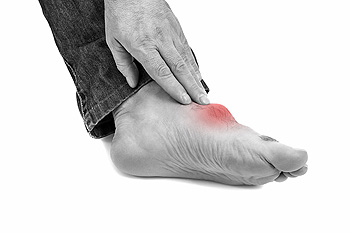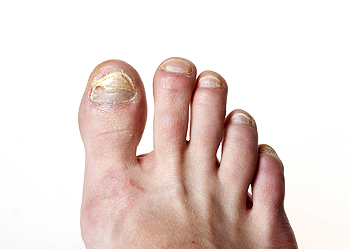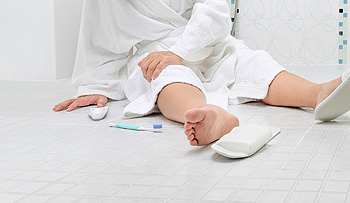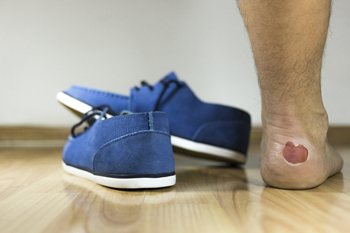North Andover (978) 686-7623
Tewksbury (978) 640-1010
Blog
February 2020
Blisters may be characterized as fluid-filled sacs that form due to friction between the foot and tightly worn socks or shoes. Some blisters may also form due to a burn or injury. To help prevent a blister from developing, it is recommended that your footwear is neither too big nor too small, as that may increase rubbing between your foot and shoe. For runners especially, it is important that you change your running shoes about every 6 months to ensure a proper fit. Some patients have found keeping their feet dry by using a foot powder has been effective in preventing blisters as well. For extra support, you may want to try doubling your socks, or taping areas that are more susceptible to getting blisters, such as the back of the heel or your toes. For more advice on the treatment and prevention of blisters it is suggested that you speak with a podiatrist for professional care.
Blisters are prone to making everyday activities extremely uncomfortable. If your feet are hurting, contact one of our podiatrists of Foot Health Center of Merrimack Valley. Our doctors can provide the care you need to keep you pain-free and on your feet.
Foot Blisters
Foot blisters develop as a result of constantly wearing tight or ill-fitting footwear. This happens due to the constant rubbing from the shoe, which can often lead to pain.
What Are Foot Blisters?
A foot blister is a small fluid-filled pocket that forms on the upper-most layer of the skin. Blisters are filled with clear fluid and can lead to blood drainage or pus if the area becomes infected.
How Do Blisters Form?
Blisters on the feet are often the result of constant friction of skin and material, usually by shoe rubbing. Walking in sandals, boots, or shoes that don’t fit properly for long periods of time can result in a blister. Having consistent foot moisture and humidity can easily lead to blister formation.
Prevention & Treatment
It is important to properly care for the affected area in order to prevent infection and ease the pain. Do not lance the blister and use a Band-Aid to provide pain relief. Also, be sure to keep your feet dry and wear proper fitting shoes. If you see blood or pus in a blister, seek assistance from a podiatrist.
If you have any questions, please feel free to contact one of our offices located in North Andover, and Tewksbury, MA . We offer the newest diagnostic and treatment technologies for all your foot care needs.
 Patients who experience the ailment that is referred to as gout are often aware of the pain and discomfort that accompanies this condition. This form of arthritis typically affects the joints of the big toe, and may cause the toe to become red and swollen. It occurs as a result of crystals that form in the joints of the foot. This can happen from elevated uric acid levels in blood, which may come from certain foods that are eaten. These types of foods that have high purine levels may include shellfish, red meat, and drinks that have excess sugar. Patients may be more susceptible to developing gout if they are obese or diabetic. There are measures that may be implemented which may prevent gout attacks from occurring. These can consist of drinking plenty of water daily, losing excess weight, and living a healthy lifestyle. If you are afflicted with gout, it is strongly advised that you are under the care of a podiatrist who can properly treat this condition.
Patients who experience the ailment that is referred to as gout are often aware of the pain and discomfort that accompanies this condition. This form of arthritis typically affects the joints of the big toe, and may cause the toe to become red and swollen. It occurs as a result of crystals that form in the joints of the foot. This can happen from elevated uric acid levels in blood, which may come from certain foods that are eaten. These types of foods that have high purine levels may include shellfish, red meat, and drinks that have excess sugar. Patients may be more susceptible to developing gout if they are obese or diabetic. There are measures that may be implemented which may prevent gout attacks from occurring. These can consist of drinking plenty of water daily, losing excess weight, and living a healthy lifestyle. If you are afflicted with gout, it is strongly advised that you are under the care of a podiatrist who can properly treat this condition.
Gout is a painful condition that can be treated. If you are seeking treatment, contact one of our podiatrists from Foot Health Center of Merrimack Valley. Our doctors will treat your foot and ankle needs.
What Is Gout?
Gout is a form of arthritis that is characterized by sudden, severe attacks of pain, redness, and tenderness in the joints. The condition usually affects the joint at the base of the big toe. A gout attack can occur at any random time, such as the middle of the night while you are asleep.
Symptoms
- Intense Joint Pain - Usually around the large joint of your big toe, and it most severe within the first four to twelve hours
- Lingering Discomfort - Joint discomfort may last from a few days to a few weeks
- Inflammation and Redness -Affected joints may become swollen, tender, warm and red
- Limited Range of Motion - May experience a decrease in joint mobility
Risk Factors
- Genetics - If family members have gout, you’re more likely to have it
- Medications - Diuretic medications can raise uric acid levels
- Gender/Age - Gout is more common in men until the age of 60. It is believed that estrogen protects women until that point
- Diet - Eating red meat and shellfish increases your risk
- Alcohol - Having more than two alcoholic drinks per day increases your risk
- Obesity - Obese people are at a higher risk for gout
Prior to visiting your podiatrist to receive treatment for gout, there are a few things you should do beforehand. If you have gout you should write down your symptoms--including when they started and how often you experience them, important medical information you may have, and any questions you may have. Writing down these three things will help your podiatrist in assessing your specific situation so that he or she may provide the best route of treatment for you.
If you have any questions, please feel free to contact one of our offices located in North Andover, and Tewksbury, MA . We offer the newest diagnostic and treatment technologies for all your foot care needs.
 The common symptoms of toenail fungus are yellow, brown, or discolored nails. In severe cases, they may crack, and can appear unsightly. It can develop as a result of an injury that has happened to the nail, or medical conditions that can include diabetes or a weakened immune system. The fungus that causes this type of infection lives and thrives in warm and moist environments. These places can often consist of public swimming pools, locker rooms, and surrounding areas. If you desire to get frequent pedicures, it is important to ensure the tools that are used are properly sterilized. If you have any of the above mentioned symptoms, it is advised that you consult with a podiatrist who can properly diagnose your ailment and offer proper treatment techniques.
The common symptoms of toenail fungus are yellow, brown, or discolored nails. In severe cases, they may crack, and can appear unsightly. It can develop as a result of an injury that has happened to the nail, or medical conditions that can include diabetes or a weakened immune system. The fungus that causes this type of infection lives and thrives in warm and moist environments. These places can often consist of public swimming pools, locker rooms, and surrounding areas. If you desire to get frequent pedicures, it is important to ensure the tools that are used are properly sterilized. If you have any of the above mentioned symptoms, it is advised that you consult with a podiatrist who can properly diagnose your ailment and offer proper treatment techniques.
If left untreated, toenail fungus may spread to other toenails, skin, or even fingernails. If you suspect you have toenail fungus it is important to seek treatment right away. For more information about treatment, contact one of our podiatrists of Foot Health Center of Merrimack Valley. Our doctors can provide the care you need to keep you pain-free and on your feet.
Symptoms
- Warped or oddly shaped nails
- Yellowish nails
- Loose/separated nail
- Buildup of bits and pieces of nail fragments under the nail
- Brittle, broken, thickened nail
Treatment
If self-care strategies and over-the-counter medications does not help your fungus, your podiatrist may give you a prescription drug instead. Even if you find relief from your toenail fungus symptoms, you may experience a repeat infection in the future.
Prevention
In order to prevent getting toenail fungus in the future, you should always make sure to wash your feet with soap and water. After washing, it is important to dry your feet thoroughly especially in between the toes. When trimming your toenails, be sure to trim straight across instead of in a rounded shape. It is crucial not to cover up discolored nails with nail polish because that will prevent your nail from being able to “breathe”.
In some cases, surgical procedure may be needed to remove the toenail fungus. Consult with your podiatrist about the best treatment options for your case of toenail fungus.
If you have any questions, please feel free to contact one of our offices located in North Andover, and Tewksbury, MA . We offer the newest diagnostic and treatment technologies for all your foot care needs.
 Research has shown that falling is common among the elderly population. People who have previously fallen may develop a fear of falling, which may prevent them from accomplishing preferred activities. Falling can happen for a variety of reasons. These often include a lack of physical strength, poor vision, or a muscle imbalance. There are methods that can be implemented that may help to prevent falling. These can consist of installing grab bars in shower and toilet areas, wearing shoes that fit correctly, and participating in a gentle exercise and stretching routine. If you would like information about how falling can affect the feet, it is suggested that you schedule a consultation with a podiatrist.
Research has shown that falling is common among the elderly population. People who have previously fallen may develop a fear of falling, which may prevent them from accomplishing preferred activities. Falling can happen for a variety of reasons. These often include a lack of physical strength, poor vision, or a muscle imbalance. There are methods that can be implemented that may help to prevent falling. These can consist of installing grab bars in shower and toilet areas, wearing shoes that fit correctly, and participating in a gentle exercise and stretching routine. If you would like information about how falling can affect the feet, it is suggested that you schedule a consultation with a podiatrist.
Preventing falls among the elderly is very important. If you are older and have fallen or fear that you are prone to falling, consult with one of our podiatrists from Foot Health Center of Merrimack Valley. Our doctors will assess your condition and provide you with quality advice and care.
Every 11 seconds, an elderly American is being treated in an emergency room for a fall related injury. Falls are the leading cause of head and hip injuries for those 65 and older. Due to decreases in strength, balance, senses, and lack of awareness, elderly persons are very susceptible to falling. Thankfully, there are a number of things older persons can do to prevent falls.
How to Prevent Falls
Some effective methods that older persons can do to prevent falls include:
- Enrolling in strength and balance exercise program to increase balance and strength
- Periodically having your sight and hearing checked
- Discuss any medications you have with a doctor to see if it increases the risk of falling
- Clearing the house of falling hazards and installing devices like grab bars and railings
- Utilizing a walker or cane
- Wearing shoes that provide good support and cushioning
- Talking to family members about falling and increasing awareness
Falling can be a traumatic and embarrassing experience for elderly persons; this can make them less willing to leave the house, and less willing to talk to someone about their fears of falling. Doing such things, however, will increase the likelihood of tripping or losing one’s balance. Knowing the causes of falling and how to prevent them is the best way to mitigate the risk of serious injury.
If you have any questions, please feel free to contact one of our offices located in North Andover, and Tewksbury, MA . We offer the newest diagnostic and treatment technologies for all your foot care needs.
Blog Archives
- 2024
- 2023
- 2022
- 2021
- 2020
- 2019
- 2018








